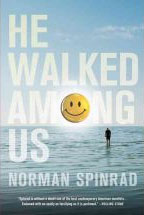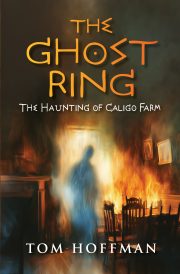Guest Post: A Viable and Just Business Model
For the Ebook Age
by Norman Spinrad
past President, SFWA
 Hubris, or not, I’ve been asked to write something like this by diverse interested parties, for the American publishing industry from top to bottom–the writers, the publishers, the points of sale–is in the middle stage of a deep crisis it cannot possibly survive in its current configuration.
Hubris, or not, I’ve been asked to write something like this by diverse interested parties, for the American publishing industry from top to bottom–the writers, the publishers, the points of sale–is in the middle stage of a deep crisis it cannot possibly survive in its current configuration.
The times they are a-changing, the question of when will probably be answered after the next Christmas season as ebooks emerge at minimum as a major market force, over 20% of book sales is a conservative guess, so the answer to that one is soon.
But into what is the existential question–for the writers who create the literary product, for the presently existing publishers and for the remaining traditional retailers at point of sales who rightly fear being evolved out of existence by the Darwinian mojo of corporate Goliaths like Amazon or Barnes and Nobel, let alone Godzilla Google.
But unlike the question of when, the answer to the question of into what is not already pre-determined. What emerges from the shark pond and what sinks into the tar pits is in the process of being decided now, and we do have free will.
That which best adapts survives, but vampire bats and urban sewer rats are as well-adapted as it gets, and the former are blood-sucking parasites, and the latter garbage eaters, and their engine of evolution is their prime directive, all-out slobbering and gobbling greed. Evolution has no moral imperative, it just blindly follows the objective of one bottom line or another, which, I suppose, is as good a definition of greed as any other.
Up to a point greed drives upwards and onwards. But when greeds collide, it’s feeding frenzy in the shark pond unless the players realize that any stable order has to have survival value for the collectivity in question, that null sum games eventually destroy themselves. Which is as good a case for the evolutionary practicality of economic justice as anything fancier ponied up by Karl Marx.
So it behooves writers, publishers, agents, writers’ organizations, and so forth to reach a collective consensus for a business model for the ebook Age, and it’s not going to be any more viable than the business model that’s disintegrating now unless it factors justice into the cold accounting equations. Otherwise the only winners will major best-selling writers, Amazon, Google, and maybe Apple, because the Big Teams are going to enter the game sooner or later.
What goes around comes around, and the brick and mortar bookstore chains having decimated the independent bookstores, are now disappearing themselves, for with the demise of Borders, Barnes & Noble is the sole major book store chain remaining and it’s been closing stores and sucking in its gut and not exactly guaranteed to survive in any but its online incarnation.
Barnes & Noble had long had a direct catalog business which more recently migrated online where it became a pretty feeble competitor of Amazon because Amazon was way ahead in the ebook market with the Kindle, which locked its ebooks into it with a proprietary format, ala the favored business model of Steve Jobs.
But Barnes & Noble chose the ePub format for its ebooks and that is an open standard, and not just for the Barnes & Noble line and its Nook. The Nook will read a few other open formats as well, and most of the other ereaders will read ePub books. So here we have two strong but quite different business models competing–the vertical monopolies of Amazon/mobi/Kindle/ and I-Pad/ Apple and the open market format based on ePub and semi-universal ebook readers.
And together, they are changing the power relations between writers and publishers ultimately in favor of the writers, to the point where if publishers don’t change the ebooks rights clauses in their contracts, they will be committing seppuku.
Publishers have been demanding control of ebook rights and the lion’s share of the proceeds since before there were ebooks or proceeds, and now it really is a deal breaker. Their contracts presently call for giving the writers between 15% and 25% of the proceeds from ebook sales.
But Amazon and Barnes & Noble allow any writer, previously unpublished or blockbuster best-seller, to sell their own ebooks directly on their sites and set their own prices within certain parameters. And such self-publishing writers get 70% of the price of every ebook sale not the 25%, which seems to have evolved into the so-called “industry standard.”
Compare the numbers for an ebook put on sale directly by the writer at $9.00 and the same ebook put on sale by a publisher at say $12.95. In the first instance, the writer makes $6.30 on each sale, in the second, through a publisher and the “industry standard” about $3.25.
Talk about greed! The publisher takes about $3 a copy for whatever it does to enhance the sales of the ebook, which, as many writers than not have unfortunately discovered, much more often than not amounts to exactly nothing.
Nothing? publishers will now exclaim. We pay for the production of the paper books, the shipping, the promotion, and we have to eat the costs of returns and remainders! And we pay 10-15% royalties on hardcovers and about 8% on trade paperbacks out of what’s left. If we’re so greedy how come our balance sheets are not exactly flourishing?
And they have a point. But only when it comes to the economics of paper books. When it comes to ebooks, once the marketing copies are uploaded to Amazon, Barnes & Noble, and so forth, there are no production costs. No printing and binding costs, no shipping or warehousing costs, no returns, nada. The publisher collects 70% of the cover price, not what in the paper world would be 40% or 50% after the author’s royalties and the discount to retailers. After the set-up of the online sales points, which costs virtually nothing but some computer time and hassle, it’s all pure profit, and everything stays in cyber print forever.
I’ve done this all by myself with backlist books that had no offers from paper publishers because of some complex tax rules which make republishing anything that’s not going to sell several thousand copies a year economically non-viable. No such problem with my self-published ebooks of previously paper published novels. I’ve been at it for less than a calendar a year thus far, making hundreds of dollars a month not thousands, which is still thousands of dollars a year for keeping titles that otherwise would disappear alive for as long as anyone wants to read them.
When you think of a century or so’s literarily worthy novels out there in limbo because golden oldies can’t compete for finite rackspace by selling only hundreds of copies a year instead of thousands, and when you consider that electronic rackspace in cyberspace is free and infinite, you don’t have to be Nostradamus to know that ebook publication is going to be the eternal afterlife of the vast and vastly growing backlist literary legacy because the way things have evolved, there is no other viable alternative business model for its survival.
Right now these are the main spoils over which publishers and writers are contending. The publishers have long since imposed cute contract language that gives them control of ebook rights at 25% of the take for the writers as long as the book is “in print” and defines “in print” as “available for purchase” including as ebook downloads, and therefore effectively meaning forever.
The publishers win this one for the moment. But the literary legacy will never be the dominant profit center of publishing, this is just about the future of the past, and this is the kind of victory that does not sweeten the atmosphere when the power balance shifts in epublishing in a broader sense, when a certain subclass of writers realize that it’s now coming into their hot little hands as the game moves into the main arena.
That one is about the future of publishing.
Let’s say you’re a major best-selling author on the Steven King or Danielle Steele level. You’ve just finished a new novel without a contract because you’re rich enough not be need an advance to finance the writing of it, but you’re greedy enough to want to make as much off it as you can. Who isn’t?
Let’s say that it’s far enough in the near future so that ebooks are roughly half the book market. Let’s say that a hardcover would go for $30 and an ebook for $10. Let’s say you took a big advance from a publisher at the cost of agreeing to that 25% of ebook sales. To make the calculation simple, let’s say the novel sells a million hardcovers and a million downloads. At 15% of $30, you make $4.5 million on the hardcover. At 25%$ of $10, you make $2.5 million off the ebooks. Total take $7 million.
But what if you sidestep the traditional publishing industry and self-publish for $10 an ebook at 70%? That’s $7 million on a million ebook sales alone. And you still own the paper publishing rights. Can you not then make a deal for those volume rights alone with a publisher for a lower advance or even no advance and still come out way ahead?
The top ten or twenty best-selling authors won’t need publishers. They can hire a computer geek to do the setting up for a grand or two and another grand or two for the online “cover art” and that’s it. They’re already brand names, and in the ebook age, national net pr would be relatively cheap and easy to buy from hired guns.
Advances? Who needs your stinkin’ advances, Random House and Simon & Schuster?
The answer, of course, is most everyone else, including, of course, yours truly. Divide all of the above by 100. At 10,000 sales at 15% of $30, I’d make $45,000 on the hardcover, at 25% of $10, $25,000 on the ebook . Total take, $70,000 for maybe an average a year’s work.
Same $70,000 if you self-publish and sell just the same 10,000 ebooks for $10 at 70%. But you still own the paper volume rights, and anything you can get for them is gravy.
A successful mid-list novel published in the traditional manner won’t make a writer rich but it will at least for a year elevate you into the dwindling middle class, ditto for just the ebook sales.
But divide that by two and you get the 5000 hardcover sales which is the average brute reality for the majority of paper novels these days and 5000 ebook sales which seems like blue sky at the moment. Total, $35,000 for a novel’s first year take, at which level a writer does need advances to keep going without a day job.
So the superstars would lose money by swallowing the publishers’ deal-breaking demand for 75% of ebook proceeds instead of self-publishing, and the paper publishers lose the top of the best-seller list unless they either raise the already onerous advances to the superstars, or up their percentages of the ebook take to make themselves attractive again. The top stars have them by the shriveling family jewels.
At the bottom end, the publishers still have the literary proletariat by the gonads, it’s accept the greedy ebook rights clause in the contract, or no contract. No advance, no deal, if you don’t like it, tough shit, it will be, and you’ll be in it.
So what else is new? It’s always been that way, and it always will be in the lower levels of the minor leagues. That’s why it’s the minor leagues. But it’s also why it can only be a minor profit center for any major publisher virtually by definition. The true existential question resides in what happens to what is presently called the “mid-list” when the major best-selling authors are lost to the traditional publishers.
The traditional publishing industry will shrink and its publishers will have to survive on so-called mid-list books, and may be able to if they play their cards realistically. “Mid-list” has come to mean anything not aimed at the best-seller list, but I’m using it to mean books that can sell something like 10,000 to 20,000 hardcovers and ebooks combined, books without the hope of even the lower end any best seller list, but that are profitable and can earn out large enough advances to keep the authors in the middle class by writing full time.
These are the writers the old line publishers will need to keep if they are to retain commercial relevance, and these writers and their books are going be their future if they are to have one. These writers can easily self-publish too, but the down and dirty economic reality being what it is, most of us are not usually in an economic position to trade away up-front money for higher royalties later.
So there is a mutual self-interest here, and this is where economic justice becomes pragmatic. In the real world to come, the old line publishers will not be able to afford to keep successful mid-list writers away from ebook self-publishing with bigger advances, since times are already tough and tight-fisted as it is on the balance sheets as the old order collapses.
So the old-line publishers must offer the writers they need to retain a more just percentage of the ebook proceeds. 50% would be a nice symbol of true partnership in the trenches.
50% would raise up the banner of communal solidarity to replace 25%’s Jolly Roger of the publishers. The writers reduce their share of what would be their 70% of ebook sales if they self-published by 20% and cede it to the publishers, the publishers meet them more or less in the middle by cutting their share of ebook money by 25%, but retain the rights to the title as long as it is still really selling some minimum number of copies a year in paper or ebook form.
In return for which they front advances and remember what the job of being a publisher once was and of necessity return to doing it. Time was, publishing was an artisanal enterprise, and while editors might have seldom been overweeningly dominant, they weren’t as subservient to BookScan numbers, publishing committees, and the sacred bottom line as they are now.
The work had an esthetic literary end to too, editors had a lot more to say about what their houses should acquire, a lot more freedom to follow their instincts and tastes, and at the literary and even practical nuts and bolts level, were teachers, and could be artistic collaborators.
The business level had always been a Darwinian arena but over the last decade or two, it devolved into a Catch-22 situation, where the big best sellers who least needed it got most of the advertising and pr money, and the mid-list which needed it most got bupkis. This made a kind of ruthless economic sense when publishers owned the rights to the best sellers, but when ebooks turn the authors thereof into their own free-standing corporations dealing directly with point of sale, that business model is gone with the electronic wind.
So the old line publishers that survive are going to live and die with what is now the mid-list because it will have to become their major profit center when authors of the top end best sellers go into business for themselves, and ditto literary agents because the best seller authors will do better hiring lawyers, pr services, and computer geeks at fixed prices than if they were paying 15% commission on their grosses.
The good news is that the same electronic revolution that will lose such publishers their superstars, upon whose titles most of their advertising and promotion budget was spent because there was no way to buy national advertising for anything else that made economic sense, now can, and must, spread it around more widely via the online media, where you can get real national coverage at affordable expense for good mid-list titles.
This is not the worst case scenario for the traditional publishing industry, this is the best case scenario. It survives by nurturing commercially viable non-best sellers, and giving the writers thereof a more just ebook deal:
50% of all ebook proceeds, advances up front as before, and some sales floor under which ebook publication no longer counts as “in print.” And who knows, some writers who come up to best sellerdom through this more just system might just feel the sense of loyalty presently in short supply between writers and publishers and stick around for the paper volume rights at least.
This is the business model publishers, writers, their agents, and writers’ organizations should be seeking to establish out of enlightened pragmatic communal self-interest.
Those who adapt survive. Those who don’t could find themselves facing the worst case scenario:
Amazon, Barnes & Noble, and Apple can easily afford to pay 70% of ebook cover prices to any writer who wants to self-publish because it costs them exactly nothing to garner their 30%–no publisher’s cut, no shipping expenses, no returns, no acquisition costs. Money for nothing and the product they’re selling is free.
What if one or all of them and maybe even Google later decided to pay advances on ebooks selected to be featured in some kind of top list on their sites, competing with the traditional publishers dollar for dollar on all professional levels, while continuing to pay 70% royalties on ebook sales and offering to sell print on demand editions with traditional volume royalties?
Why they would become publishers themselves, now wouldn’t they? Publishers with a new business model that would either force traditional publishers to give up ebook rights entirely on anything worth publishing at all or out of existence completely along with the brick and mortar bookstore chains already reduced to one and become collectively a vertical monopoly.
Do traditional publishers really want that to happen?
Do writers?
Think about it.
But not for too long.
The Great Wheel turns, and we turn with it, those who do not will be crushed beneath it. Those who adapt will survive.
•••
 Norman Spinrad is the author of over twenty novels, including Bug Jack Barron, The Iron Dream, Child of Fortune, Pictures at 11, Greenhouse Summer, and The Druid King.
Norman Spinrad is the author of over twenty novels, including Bug Jack Barron, The Iron Dream, Child of Fortune, Pictures at 11, Greenhouse Summer, and The Druid King.
He has also published something like 60 short stories collected in half a dozen volumes. The novels and stories have been published in about 15 languages.
His most recent novel length publication is He Walked Among Us, published in April 2010 by Tor in hardcover and April 2011 in trade paperback.
He’s written teleplays, including the classic Star Trek, “The Doomsday Machine,” and two produced feature films DRUIDS and LA SIRENE ROUGE. He is a long time literary critic, sometime film critic, perpetual political analyst, and sometime songwriter.
He’s also briefly been a radio phone show host, has appeared as a vocal artist on three albums, and occassionally performs live. He’s been a literary agent, and President of the Science Fiction Writers of America and World SF. He’s posted 27 YouTube videos to date.
He grew up in New York, has lived in Los Angeles, San Francisco, London, and Paris, and travelled widely in Europe and rather less so in Latin America, Asia, and Oceania.


